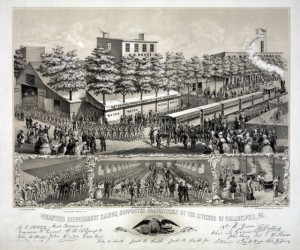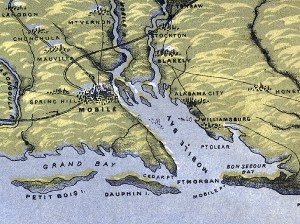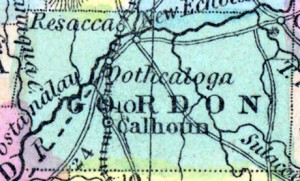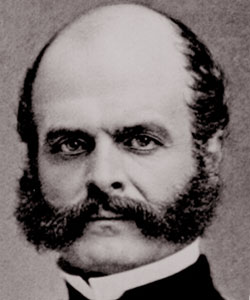As the 150th anniversary of the 1860 election is next week, the House Divided project has just published seven interactive essays at Journal Divided that focus on different aspects of Abraham Lincoln’s campaign. These essays have been adapted with permission from the unedited manuscript of Michael Burlingame’s Abraham Lincoln: A Life (2008). One can read about the origins of the “rail-splitter” image and Lincoln’s efforts to gain support from the Know Nothings. In addition, one will find an overview of the Republican National Convention as well as a detailed look at how Lincoln won the nomination. While Lincoln instructed his allies at the convention to “make no contracts that will bind me,” Burlingame discusses the contradictory claims and evidence about the deals made to secure Lincoln’s nomination. In the final essay Burlingame examines the political conditions that produced a Republican victory in November 1860. As you read the essays, be sure to click through the sidenotes on every page. These contain links to relevant records on House Divided, including those for documents, events, people, place, major topics, and sources. For example, the Gott resolution is mentioned on page 5 of the “Lincoln Know Nothing” essay. If you are unfamiliar with that topic, simply click on the “Events” sidenote to learn more. Each essay also has a video, which you can watch by clicking on the YouTube icon.
27
Oct
10
24
Aug
10
Refreshment Saloons in Civil War Philadelphia
Posted by mckelveb Published in Civil War (1861-1865), Images, Recent Scholarship Themes: Business & IndustryHouse Divided is in the process of adding interactive essays to the database as a part of its Journal Divided project. I created an essay on the Philadelphia refreshment saloons that specifically focused on the Cooper Shop Volunteer Refreshment Saloon and its contribution to the city’s home front relief efforts during the Civil War. The Cooper Shop opened on May 26, 1861 and went on to add a hospital in October that cared for sick and wounded soldiers throughout the duration of the war. Although larger refreshment saloons formed in the city, Philadelphia’s residents warmly remembered the Cooper Shop because of the dramatic individual efforts of its three leaders: William M. Cooper, the president of the establishment, Dr. Andrew Nebinger, the head surgeon of the Cooper Shop Hospital, and Anna M. Ross, the Lady Principle of the hospital. Visiting physicians such as Dr. C.E. Hill described the positive atmosphere created by the committee’s hospitality and claimed, “soldiers were never better cared for than in this hall.” The refreshment saloons are still remembered in modern scholarship as historian J. Matthew Gallman commented, the saloons “greatest benevolent contribution cannot be measured by returns on ledger sheets, but by the long hours devoted to sewing clothes, cooking food, and ministering to wounded soldiers.” The saloons closed in late August 1865 as the war came to an end and they were no longer needed.
For more interactive essays, visit the Journal Divided Site. Click on any of the images below to view a slide show of the Philadelphia Volunteer Refreshment Saloons during the Civil War in Flickr.
24
Aug
10
Union Soldiers – Cumberland County, Pennsylvania
Posted by sailerd Published in Civil War (1861-1865), Letters & Diaries, Recent Scholarship Themes: Battles & Soldiers, Carlisle & Dickinson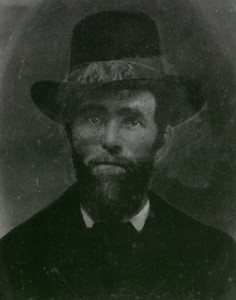
John Cantilion
The House Divided project received permission from the Cumberland County Historical Society to post articles that explore topics related to the Civil War era in Cumberland County, Pennsylvania. These essays originally appeared in the Cumberland County History Journal. Right click on the links below and select “save as” to download the article as a PDF file. (Adobe Reader is a free program that is required to vide these documents).
Patricia Coolmeyer, “Southern Sentiments: A Look at Attitudes of Civil War Soldiers ,” Cumberland County History 7 (1990): 68-79.
- Patricia Coolmeyer’s essay explores the different ways that soldiers and residents of southern Pennsylvania saw the South during the Civil War. Coolmeyer uses a wide variety of sources in her account, including letters, diaries, local newspapers, and other nineteenth-century publications.
James A. Holechek, “From Carlisle and Fort Couch: The War of Corporal John Cantilion,” Cumberland County History 10 (1993): 71-80.
- James A. Holechek’s article focuses on Corporal John Cantilion’s experiences in central Pennsylvania during the summer of 1863. Cantilion served in the 4th United States Cavalry and was stationed at Carlisle Barracks in early June 1863. This essay includes transcripts of letters that Cantilion wrote from Carlisle Barracks on June 19 and from Fort Couch on June 23. Holechek also provides the transcript of a letter that Cantilion’s wife, Sarah, wrote in early November 1863. However, Cantilion died on November 12, 1863 and never received that letter. In addition, photographs of John and Sarah Cantilion are reproduced in this essay.
20
Jul
10
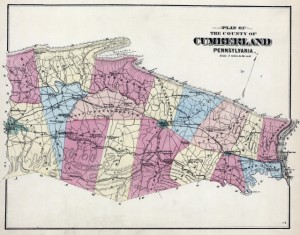 Cumberland County History, a historical journal compiled annually by the Cumberland County Historical Society, has provided nearly three decades of research into the county’s long history. The journal has published several articles on Civil War soldiers from the surrounding community. They utilize several primary documents and effectively offer insight into the emotional departure from loved ones, the lives of soldiers during the war, and the enemy just beyond the Mason-Dixon Line.
Cumberland County History, a historical journal compiled annually by the Cumberland County Historical Society, has provided nearly three decades of research into the county’s long history. The journal has published several articles on Civil War soldiers from the surrounding community. They utilize several primary documents and effectively offer insight into the emotional departure from loved ones, the lives of soldiers during the war, and the enemy just beyond the Mason-Dixon Line.
James A. Holechek features the Civil War experiences of John Cantilion in his article “From Carlisle and Fort Couch: The War of Corporal John A. Cantilion.” By tracing his service in the United States army through to his untimely death in November 1863, Holechek surmises the emotions inherent to leaving loved ones behind as a soldier and, conversely, watching a loved one leave to fight in battle. Letters became the only connection between Cantilion and his wife and children. Accordingly, Holechek used these letters as a window into how the separation affected both parties.
The letters of Lt. Thomas William Sweeny are discussed and provided in part in “Carlisle Barracks –1854-1855: From the Letters of Lt. Thomas W. Sweeny, 2nd Infantry,” edited by Robert Coyer. Sweeny stayed in the Carlisle Barracks for some time during the 1850s before moving to Missouri as a general recruiter for the Union. His time spent in Missouri, as argued by Coyer, “played a major part in keeping the state from seceding.” Most of Coyer’s article centers around several letters he wrote to his wife through 1854 and 1855, part of the time he spent at the Barracks. Though these letters could not note the anguish of separation of loved ones during the war, the tense and difficult relations between the couple become apparent when reading even the first letter.
Patricia M. Coolmeyer collects the perspectives of Civil War soldiers from southern Pennsylvania through the extensive use of personal letters, diaries, and local newspapers. Her article, “Southern Sentiments: A Look at Attitudes of Civil War Soldiers,” illustrates the ways Carlisle, given its geographic proximity to the Mason-Dixon Line, often exchanged its culture and relations with the South. As a result, towns like Carlisle did not uniformly despise the South but rather saw an “active pro-Southern element.” This lack of uniformity emerged in Pennsylvanian soldiers. From one perspective, Union soldiers saw Southerners as “quite a fine looking, gentlemanly set of fellows. Others shaped their perceptions based on the beautiful landscape of the South. Each soldier found different ways to build their allegiance to the Union, but, as Coolmeyer makes clear, it did not always emerge out of a hatred of the South.
The Cumberland County Historical Society has granted us special permission to publish these articles. We encourage readers to utilize their resources, for they have compiled an extensive library filled with primary documents and modern scholarly research. Please consult their website for more information including how to contact the Society.
20
Jul
10
Battle of Nashville: December 15-16, 1864
Posted by mckelveb Published in Civil War (1861-1865), Images, Maps, Places to Visit, Recent Scholarship Themes: Battles & Soldiers The Battle of Nashville took place on December 15-16, 1864 in Davidson County, Tennessee as a part of the Franklin-Nashville Campaign. Beginning in November 1864, Confederate General John Bell Hood led the Army of Tennessee towards Nashville in a last attempt to move Union Major General William T. Sherman out of Georgia. By December 1, 1864 Union Major General George H. Thomas and his forces reached Nashville and spent the next two weeks preparing for battle. The fighting began in the morning on December 15 with most of the Union assaults on the Confederates ending successfully. The following day, the Union troops charged the Confederate forces and made them abandon Nashville and retreat across the Tennessee River. The Civil War Preservation Trust’s website offers an article: “The Decisive Battle of Nashville” that provides an overview of the fighting. The website also includes a map that depicts troop movements on both sides as well as brief biographies of General Hood and General Thomas. Also, the Battle of Nashville Preservation Society website offers historic sites and photographs related to the battle. Some other resources that may be useful are the Memoir of Major General George H. Thomas and John Bell Hood’s Advance and Retreat: Personal Experiences in the United States and Confederate Armies which could provide contrasting views from commanding officers in both the Union and Confederate Armies to give different perspectives of the battle. Richard M. McMurry commented on the Battle of Nashville in his book:
The Battle of Nashville took place on December 15-16, 1864 in Davidson County, Tennessee as a part of the Franklin-Nashville Campaign. Beginning in November 1864, Confederate General John Bell Hood led the Army of Tennessee towards Nashville in a last attempt to move Union Major General William T. Sherman out of Georgia. By December 1, 1864 Union Major General George H. Thomas and his forces reached Nashville and spent the next two weeks preparing for battle. The fighting began in the morning on December 15 with most of the Union assaults on the Confederates ending successfully. The following day, the Union troops charged the Confederate forces and made them abandon Nashville and retreat across the Tennessee River. The Civil War Preservation Trust’s website offers an article: “The Decisive Battle of Nashville” that provides an overview of the fighting. The website also includes a map that depicts troop movements on both sides as well as brief biographies of General Hood and General Thomas. Also, the Battle of Nashville Preservation Society website offers historic sites and photographs related to the battle. Some other resources that may be useful are the Memoir of Major General George H. Thomas and John Bell Hood’s Advance and Retreat: Personal Experiences in the United States and Confederate Armies which could provide contrasting views from commanding officers in both the Union and Confederate Armies to give different perspectives of the battle. Richard M. McMurry commented on the Battle of Nashville in his book:
“Late that rainy day, as Hood was conferring with Stewart, the Yankee’s swarmed over Shy’s Hill, annihilating the defenders and sending the remnants of Cheatham’s corps flying off in mad panic. The rout spread to Stewart’s corps. Only Lee’s men preserved a semblance of order, as most of the army dissolved and fled southward in darkness and rain. Hood and other officers tried desperately to rally the fleeing soldiers, but, save for a brave, defiant few who turned to fire at the Federals, their efforts were in vain. Over the fast thawing ground and through sticky mud, the Confederates made their way southward, while Lee strung his corps across the rear of the army to slow the Yankee pursuit. All that night Hood’s men jammed the roads southward from Nashville, abandoning wagons and cannons, throwing away muskets, swords, knapsacks, and camp equipment.”
19
Jul
10
“Stephen Finding His Mother” 1860 Political Cartoon
Posted by rothenbb Published in Antebellum (1840-1861), Images, Recent Scholarship Themes: Contests & Elections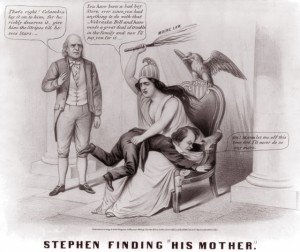 Louis Maurer mocked presidential candidate Stephen Douglas in the cartoon “Stephen Finding His Mother.” Through the months leading up to the election in late 1860, Douglas engaged in an unprecedented national campaign tour. In response to critics of his new vote-gathering methods, he falsely claimed to visit his mother when he lead his tour through New York and New England. Using this story as the basis for the cartoon, Maurer shows Columbia as Douglas’ “mother” who, at the urging of Uncle Sam, punishes him for dividing Democrats and bringing scorn from Republicans. She uses a branch labeled the “Maine Law,” a possible reference to Maine’s 1851 temperance law, to “give him the Stripes till he sees Stars.”
Louis Maurer mocked presidential candidate Stephen Douglas in the cartoon “Stephen Finding His Mother.” Through the months leading up to the election in late 1860, Douglas engaged in an unprecedented national campaign tour. In response to critics of his new vote-gathering methods, he falsely claimed to visit his mother when he lead his tour through New York and New England. Using this story as the basis for the cartoon, Maurer shows Columbia as Douglas’ “mother” who, at the urging of Uncle Sam, punishes him for dividing Democrats and bringing scorn from Republicans. She uses a branch labeled the “Maine Law,” a possible reference to Maine’s 1851 temperance law, to “give him the Stripes till he sees Stars.”
By 1860 Stephen Douglas had encountered criticism despite his great achievements in Congress. Maurer’s cartoon, though immediately drawing from Douglas’ “mother” story, connected with other issues. Douglas had begun alienating himself from Southern Democrats as an opponent to the extension of slavery. Critics also cited his close association with the Kansas-Nebraska Act, which determined the extension of slavery based on a state’s majority vote. Though the Act promised the success of this “popular sovereignty” within Kansas and Nebraska, it soon backfired and brought even more tension and violence to the states.
Robert W. Johannsen wrote a leading biography entitled Stephen A. Douglas. The book, available for partial view on Google Books, provides closer analyses of Douglas through the campaign of 1860.
19
Jul
10
Battle of Mobile Bay: August 2-23, 1864
Posted by mckelveb Published in Civil War (1861-1865), Images, Lesson Plans, Maps, Places to Visit, Recent Scholarship Themes: Battles & SoldiersThe Battle of Mobile Bay (also known as the Passing of Forts Morgan and Gaines) took place from August 2-23, 1864 in Mobile and Baldwin Counties, Alabama. In early August, a large Union fleet under the command of Admiral David G. Farragut entered Mobile Bay and came under fire from Confederate forces. Farragut led his forces past the forts and forced Confederate Admiral Franklin Buchanan to surrender. On August 23, Fort Morgan was the last place to fall and Mobile Bay’s port closed. The Civil War Preservation Trust’s website offers an article, “Damn the Torpedoes: The Battle of Mobile Bay,” which provides a detailed summary of the battle and its commanding officers. The website also includes a map that depicts the movement of Union and Confederate forces as well as a list of recommended readings for more information on Mobile Bay. The National Park Service’s website includes a lesson plan on Fort Morgan and the Battle of Mobile Bay that includes images, readings, and maps. Foxhall Alexander Parker commented on Farragut as he and his forces crossed into Mobile Bay:
“As they were passing the Brooklyn, her captain reported ‘a heavy line of torpedoes across the channel.’ ‘Damn the torpedoes!’ was the emphatic reply of Farragut. ‘Jouett, full speed! Four bells, Captain Drayton.’ And the Hartford, as if eager to bear the admiral’s flag to the front, bounded forward ‘like a thing of life,’ and, increasing her speed at each instant, crossed both lines of torpedoes, going over the ground at the rate of nine miles an hour; for so far had she drifted to the northward and westward while her engines were stopped, as if to make it impossible for the admiral, without heading directly on to Fort Morgan, to obey his own instructions to ‘pass eastward of the easternmost buoy.’”
Another resource that may be useful is West Wind, Flood Tide: The Battle of Mobile Bay, available as a preview on Google Books, which provides a detailed overview of the Battle of Mobile Bay and its significance during the Civil War. Also available on Google Books is By Sea and By River: The Naval History of the Civil War which includes details on the battle as well as the aftermath and consequences of Mobile Bay. The Civil War Trail’s website has information for those planning on visiting the battle site for a field trip as well as details on the different stops within the area and historic sites close by.
16
Jul
10
Battle of Resaca: May 13-15, 1864
Posted by mckelveb Published in Civil War (1861-1865), Letters & Diaries, Maps, Recent Scholarship Themes: Battles & SoldiersThe Battle of Resaca took place from May 13-15, 1864 in Gordon and Whitfield Counties in Georgia as a part of the Atlanta Campaign. A majority of the fighting took place on May 14 when Union Major General William T. Sherman and the Military Division of the Mississippi attacked Confederate General Joseph E. Johnston and the Army of Tennessee. The battle continued into the following day without much success on either side until General Sherman sent troops across the Oostanaula River in the direction of the Confederate supply line, forcing Johnston to retire from the battle. The Civil War Preservation Trust’s website offers an article, “Battle of Resaca: Botched Union Attack,” which describes missed Union opportunities that may have helped them win the battle. The website also includes brief biographies of General Sherman and General Johnston as well as a map that shows troop movement on the Union and Confederate sides. Sherman described the Battle of Resaca in a letter to his brother, Senator John Sherman:
“Johnston had chose Dalton as his place of battle, but he had made all the road to it so difficult that I resolved to turn it, so I passed my army through a pass about twenty miles south of Dalton and forced him to battle at Resaca. That, too, was very strong, but we beat him at all points and as I got a bridge across the Oostanaula below him and was gradually getting to his rear, he again abandoned his position in the night and I have been pushing my force after him as fast as possible; yet his knowledge of the country and the advantage of a good railroad to his rear enabled him to escape me, but I now have full possession of all the rich country of the of the Etowah. We occupy Rome, Kingston, and Cassville.”
In terms of modern scholarship, another resource that may be interesting to browse is Philip L. Secrist’s The Battle of Resaca: The Atlanta Campaign, 1864, available as a preview on Google Books, which gives a summary of the battle as well as the rest of the campaign that followed. Also available on Google Books, Union General Ulysses S. Grant commented on the battle briefly in his book, Personal Memoirs while Craig L. Symonds’s Joseph E. Johnston: a Civil War Biography provides more of a Confederate perspective of the fighting. The Library of Congress’s online collection of Lincoln Papers includes a transcripted letter from Daniel E. Sickles to President Abraham Lincoln describing Sherman’s movements during the battle.
16
Jul
10
“The national game. Three ‘outs’ and one ‘run,'” 1860 political cartoon
Posted by solnitr Published in Antebellum (1840-1861), Images, Recent Scholarship Themes: Contests & Elections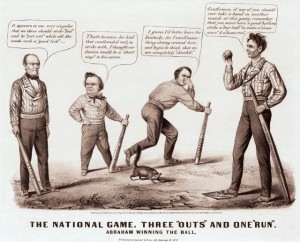 The German artist, Louis Maurer, drew upon an American sport—baseball—for this pro-Lincoln political cartoon, which Currier & Ives published in September 1860, only two months before the presidential election of 1860. Maurer created a parody of the four main presidential candidates (from left to right): Constitutional Union Party candidate John Bell, Northern Democratic Party candidate Stephen A. Douglas, Southern Democratic Party candidate John C. Breckinridge, and Republican Party candidate Abraham Lincoln. Lincoln, who stands on the home plate, reminds his opponents that they need a “good bat” to hit a home run. Each baseball player’s bat represents the platform they are running on. The artist suggests that Lincoln’s bat of “equal rights and free territory” is more powerful than Breckinridge’s Southern “slavery extension” bat, Douglas’ pro-states’ rights bat of “non intervention” or Bell’s bat “fusion,” which the cartoon of Douglas refers to as a strategy to defeat Lincoln. All of the candidates also wear belts that either reflect a personal or party characteristic. For example, Douglas’ belt reads “Little Giant,” a nickname that became popular during the 1858 Lincoln-Douglas debates for Illinois senator. On the other hand, Lincoln’s “Wide Awake Club” belt eludes to the group of young, Republican men of the same name who marched in Northern cities to gain support for Lincoln. To learn more about the “Wide Awakes” and their influence as a grassroots political group, read this article from the Journal of American History.
The German artist, Louis Maurer, drew upon an American sport—baseball—for this pro-Lincoln political cartoon, which Currier & Ives published in September 1860, only two months before the presidential election of 1860. Maurer created a parody of the four main presidential candidates (from left to right): Constitutional Union Party candidate John Bell, Northern Democratic Party candidate Stephen A. Douglas, Southern Democratic Party candidate John C. Breckinridge, and Republican Party candidate Abraham Lincoln. Lincoln, who stands on the home plate, reminds his opponents that they need a “good bat” to hit a home run. Each baseball player’s bat represents the platform they are running on. The artist suggests that Lincoln’s bat of “equal rights and free territory” is more powerful than Breckinridge’s Southern “slavery extension” bat, Douglas’ pro-states’ rights bat of “non intervention” or Bell’s bat “fusion,” which the cartoon of Douglas refers to as a strategy to defeat Lincoln. All of the candidates also wear belts that either reflect a personal or party characteristic. For example, Douglas’ belt reads “Little Giant,” a nickname that became popular during the 1858 Lincoln-Douglas debates for Illinois senator. On the other hand, Lincoln’s “Wide Awake Club” belt eludes to the group of young, Republican men of the same name who marched in Northern cities to gain support for Lincoln. To learn more about the “Wide Awakes” and their influence as a grassroots political group, read this article from the Journal of American History.
In the end, Breckinridge admits defeat, holding his nose as he moves away from the skunk in the foreground. At the time, “skunk’d” was used as a baseball term to describe a shutout or a large margin of victory. The baseball context of “The national game. Three ‘outs’ and one ‘run’” presents an engaging way to introduce this political cartoon to the classroom. The first chapter of Jules Tygiel’s book Past Time: Baseball as History (2001) explains this cartoon’s political references within the framework of the history of baseball as an American sport.
14
Jul
10
Battle of the Crater- July 30, 1864
Posted by mckelveb Published in Civil War (1861-1865), Maps, Recent Scholarship Themes: Battles & SoldiersThe Battle of the Crater (also known as The Mine) took place on July 30, 1864 in Petersburg, Virginia. Union forces under the command of Major General Ambrose E. Burnside exploded a mine and created a large gap in the Confederate protection of Petersburg. However, the Confederate Major General William Mahone and his forces responded with various counterattacks that resulted in high casualties for the Union forces, especially the United States Colored Troop Regiments present. The National Parks Service website provides a detailed summary of the Battle of the Crater that includes several sketches of the battlefield. The Civil War Preservation Trust’s website offers several resources on the battle such as an article on the Petersburg Campaign and short biographies of Union General Burnside and Confederate General Robert E. Lee. John F. Schmutz recounted the battle in his book, The Battle of the Crater: A Complete History:
“Whenever the first division attempted to advance out of the Crater, they were soon met by intense fire from the Confederate infantry, which had by then recovered its composure after the explosion and bombardment, as well as the Rebel artillery, which had found the range on the Federals in the Crater. Many were hit not only from the exposed flanks, but also from the rear, as the Confederates reoccupied the transverses and entrenchments to the right and left of the Crater. These men had recovered their equanimity and when the Union attempted to re-form on the Confederate side of the Crater, the Rebels faced about and delivered a fire into the backs of the Federals. Coming so unexpectedly, this caused the forming line to fall back into the Crater.”
Another resource which may be interesting to browse is Edward Alexander Porter’s Fighting for the Confederacy: the Personal Recollections of General Edward Alexander Porter which provides a firsthand account of the battle from the Confederate perspective. Also available on Google Books as a preview is Earl Hess’s In the Trenches at Petersburg which gives a summary of the action at the Crater as well as a map of the battlefield. The Battle of the Crater could be connected to a lesson on United States Colored Troops in the Civil War as a previous post on Blog Divided gives details on the participation of the 43rd USCT Regiment during the battle. For further reading, Gregory J.W. Urwin’s Black Flag over Dixie and John David Smith’s Black Soldiers in Blue: African American Troops in the Civil War Era both provide an account of the experiences of black soldiers during the Battle of the Crater.

